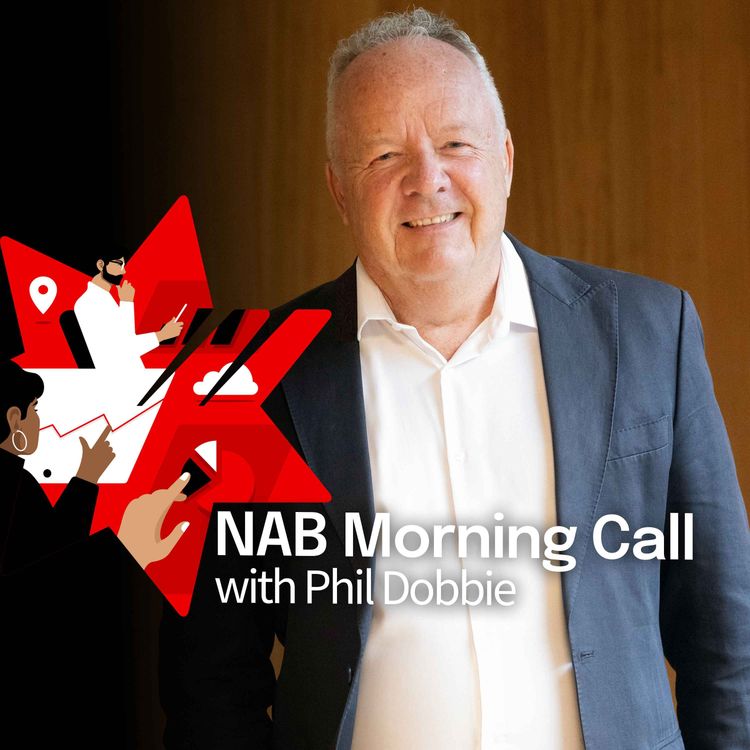Share

NAB Morning Call
Inflation in no hurry to come down, and neither is the US dollar
Thursday 14th November 2024
NAB Markets Research Disclaimer
Financial Services Guide | Information on our services - NAB
The US dollar continues to push higher, with the AUD one of the main casualties. The PBoC is also clearly concerned about the weakness on the CNY. It’s not just the dollar that is staying high - US inflation is taking a while to come down. The CPI number overnight was as expected, though markets seem to be reacting as though they are relieved it wasn’t higher. As a result, pricing for a December rate cut increased slightly. Locally, the Australian Wage price Index slowed a little more than expected, but not enough of a move to change the timing for the RBA. NAB’s Taylor Nugent joins Phil to discuss all this, plus all the rest of today’s market news.
More episodes
View all episodes

37. About Turn on Risk
13:41||Season 10, Ep. 37Tuersday 24th February 2026NAB Markets Research Disclaimer Financial Services Guide | Information on our services - NABNAB’s Ray Attrill joins Phil to dissect a classic "risk-off" shift in the global markets, marked by a retreat in US stocks and a pivot toward safe-haven assets. They explore the fallout from recent US Supreme Court rulings on trade policy, the persistent volatility surrounding the AI and software sectors, and shifting labor market expectations, highlighted in a speech nby Chris Waller overnight. Plus, the surprising resilience of the German business climate and the strengthening of the Chinese Renminbi as markets return from the Lunar New Year break.
36. Courting global tariffs as US GDP takes a hit
17:17||Season 10, Ep. 36Monday 23rd February 2026NAB Markets Research Disclaimer Financial Services Guide | Information on our services - NABPhil sits down with NAB’s Rodrigo Catril to break down a chaotic weekend in US trade policy following the Supreme Court's ruling against previous tariff structures and the administration's subsequent pivot to a global 15% tariff. They discuss the ripple effects across global markets—including a surprisingly resilient Aussie dollar—while analysing a significant miss in US Q4 GDP and the implications of rising core PCE on future Fed easing. They also touch on the latest global PMI data, showing unexpected strength in the UK and Germany, and preview a busy week ahead featuring Australian CPI and insights from Fed officials on the economic impact of AI.
35. Weekend Edition: AI Creates Jobs Too.
22:00||Season 10, Ep. 35Friday 21st February 2026Please note this communication is not a research report and has not been prepared by NAB Research analysts. Read the full disclaimer here.In this weekend’s podcast, Dr. Blair Chapman, Senior Economist at SEEK, previews the upcoming SEEK AI Gauge Report, highlighting that while overall job ad volumes have recently declined, demand for AI-specific skills is surging. Chapman notes a "broadening" of AI demand beyond the technical IT sector into fields like marketing and content creation, where approximately one in 20 ads now request AI proficiency. While the podcast addresses common fears of job displacement, particularly in entry-level white-collar roles, Chapman emphasizes that AI is currently augmenting rather than replacing most positions and creating new specialized roles such as AI ethics officers and AI content trainers. Ultimately, the discussion suggests that "AI fluency" is becoming a baseline requirement across the Australian workforce to drive productivity and navigate the evolving labour market.
34. Aussie unemployment supports rate hike, higher tension in Middle East
15:22||Season 10, Ep. 34Friday 20th February 2026NAB Markets Research Disclaimer Financial Services Guide | Information on our services - NABAustralia’s unemployment rate held steady at 4.1%, reinforcing the case for a potential RBA rate hike in May as the labour market remains tighter than expected. Meanwhile, oil prices have surged above $71.80 a barrel as the U.S. bolsters its air power in the Middle East to levels not seen since 2003, creating a volatile backdrop of geopolitical risk. While the U.S. continues to show economic resilience with a strong labor market, a record-high trade deficit and cautious outlooks from major retailers like Walmart are tempering global market optimism. NAB’s Skye Masters joins Phil to talk through the overnight market news.
33. War, wages and algorithms
15:48||Season 10, Ep. 33Thursday 19th February 2026NAB Markets Research Disclaimer Financial Services Guide | Information on our services - NABThings are heating up in the Middle East, with Iran getting itself ready in case talks fail. As a result oil prices have moved up sharply, with Brent back over $70 a barrel. While the geopolitical scene is tense, tech stocks are bouncing back, perhaps using a set of moderately optimistic second-tier data as the reason. Meanwhile NAB’s Gavin Friend talks through UK inflatioin, which has cooled to 3%, and Aussie wages holding steady at 3.4%. Australian employment numbers are out today and, to top it all off, the tech world is bracing for Mark Zuckerberg’s landmark testimony on whether Meta’s algorithms are intentionally addictive—an outcome that could have a big impact on share prices. Gavin also manages to sneek in the FOMC minutes, just released.
32. Choppy markets settle as Middle East war risk fades
13:16||Season 10, Ep. 32Wednesday 18th February 2026NAB Markets Research Disclaimer Financial Services Guide | Information on our services - NABA choppy session for equities, bonds and energy, as Iran went from powder keg to hopes of peace. As NAB’s Rodrigo Catril says the talks have a long way to go and oil is still well down despite the switch in sentiment. Phil and Rodrigo also break down the pound’s 0.6% slide following a rise in UK unemployment to 5.2% and they dive into the RBA’s latest minutes, which showed a hold was given consideration. There’s also discussion on Canada’s "slow grind" disinflation and a look ahead to today’s Australian Wage Price Index and the RBNZ rate decision.
31. Out of Office
13:28||Season 10, Ep. 31Tuesday 17th February 2026NAB Markets Research Disclaimer Financial Services Guide | Information on our services - NABTrading was thin with holidays in the US and Asia on Monday, but there was still data around. NAB’s Sally Auld talks to Phil about jittery GDP figures from Japan and the mixed industrial signals coming out of Europe. They also weigh up the latest Bank of America fund manager survey, which shows high investor optimism despite a lack of downside protection, and touch on why geopolitical tensions in the Middle East are keeping a floor under oil prices.
30. US inflation slows faster, but still a bit to go
14:31||Season 10, Ep. 30Monday 16th February 2026NAB Markets Research Disclaimer Financial Services Guide | Information on our services - NABPhil catches up with NAB’s Ken Crompton to break down the fallout from a cooler-than-expected 0.2% US inflation print, which sent bond yields tumbling and left the US 2-year yield at its lowest level since mid-2022. They dig into the reality of the Fed’s waiting game, the New York Fed data showing that US consumers and firms are footing 90% of the tariff bill, and why the "AI vigilantes" are continuing to eye tech stocks with a bit more scepticism. From the Bank of England’s internal split over rate hikes to a busy week ahead featuring Japan's Q4 GDP and fresh inflation numbers from the UK and Canada, it’s a deep dive into whether the global disinflation trend is truly taking hold or hitting a snag.
29. Weekend Edition: From Dairy to Data: Can NZ Outgrow Australia’s Shadow?
30:01||Season 10, Ep. 29Friday 13th February 2026Please note this communication is not a research report and has not been prepared by NAB Research analysts. Read the full disclaimer here.Phil grills BNZ Head of Research Stephen Toplis on which central bank played the inflation fight better — the RBNZ with its early hammer, or the RBA with its softer touch. They tear into NZ’s slow growth, a labour market now showing 5.4% unemployment, population pressures, housing distortions, and whether China’s slowdown or Trump‑era geopolitics pose the bigger threat. Plus: can NZ keep leaning on agriculture, is tech finally a real opportunity, and how do the two neighbours stack up on growth, risks and untapped upside.